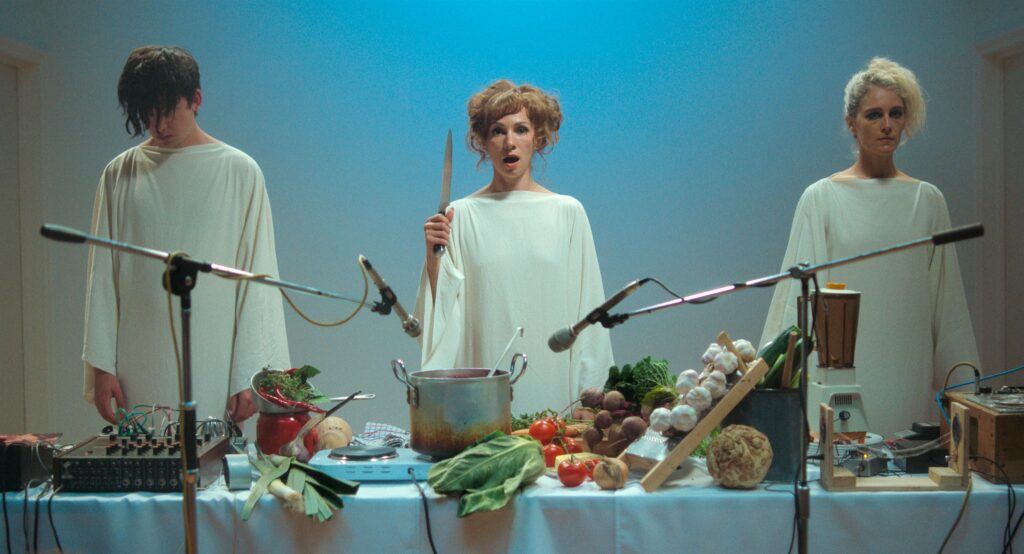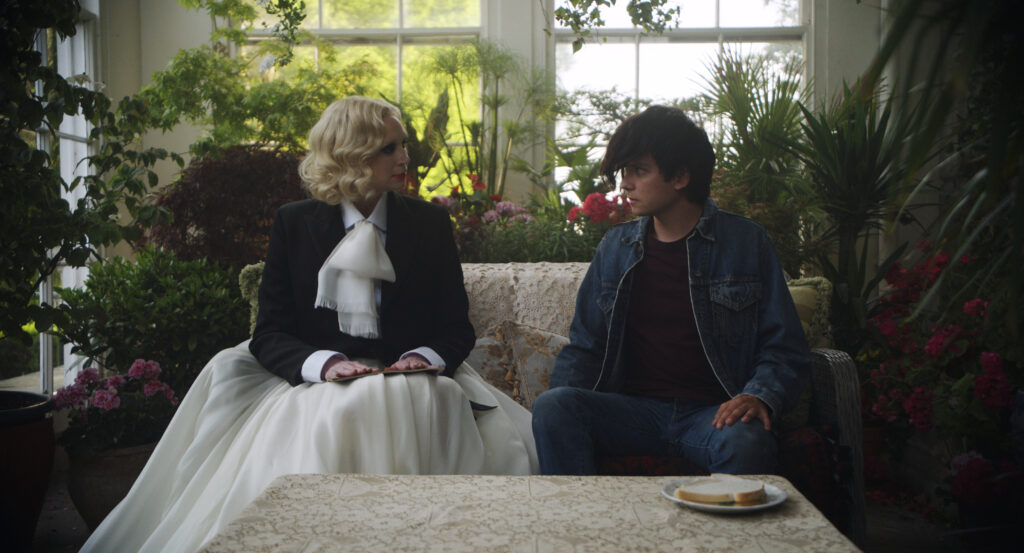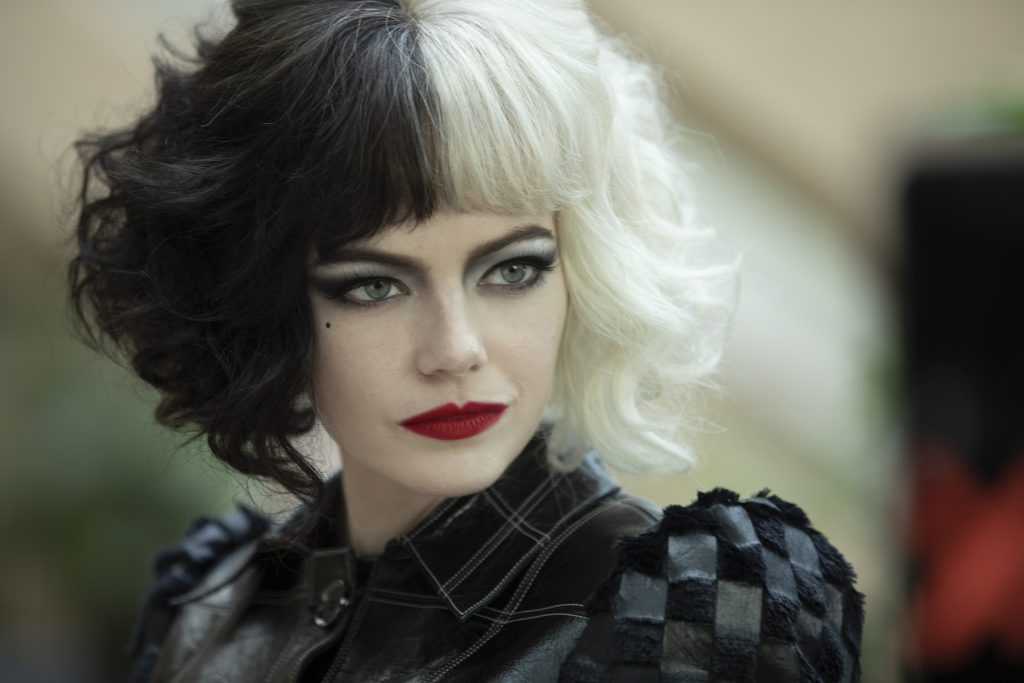July 21, 2022
by Carla Hay

Directed by Peter Strickland
Some language in Greek and German with subtitles
Culture Representation: Taking place primarily in an unnamed city in England, the comedy/drama film “Flux Gourmet” features an all-white cast of characters representing the working-class and middle-class.
Culture Clash: Three artists, who are in a group that combines food and sonic experiences, have ego battles and power struggles during a month-long residency at a culinary institute, while the person hired to document this residency has severe intestinal problems.
Culture Audience: “Flux Gourmet” will appeal primarily to people who are fans of star Gwendoline Christie and filmmaker Peter Strickland, as well as to viewers who want to see a very offbeat satire of culinary institutions.

“Flux Gourmet” has some elements of body horror, but viewers are better off knowing that the movie is a dark comedy rather than anything that’s sinister. The tone is amusing and annoying, but presented in an original way. And although parts of “Flux Gourmet” tend to drag, the movie will keep open-minded viewers curious enough to see what will happen next. However, just like certain foods, “Flux Gourmet” has a “gross-out” factor that definitely isn’t for everyone.
Written and directed by Peter Strickland, “Flux Gourmet” takes place over three weeks at a culinary institute in an unnamed city in England. (The movie was actually filmed in Yorkshire, England.) “Flux Gourmet” revolves around the fictional Sonic Catering Institute, an avant-garde, live-in culinary program where residents perform art that combines sounds and food. The institute’s director is the imposing Jan Stevens (played by Gwendoline Christie), who gets people to do what she wants by convincing them that her ideas are the best ideas.
At the moment, Jan’s attentions are preoccupied by three Sonic Catering Institute residents, who have formed a band but don’t yet have a name for the band. A running joke in the movie is that people spend a lot of time arguing about what this band will be doing for its art performances, but the band members can’t even decide on what the band’s name will be. Two of the possible band names are Elle and the Fatty Acids and Elle and the Gastric Ulcers.
The band’s leader is the hot-tempered Elle di Elle (played by Fatma Mohamed), who clashes with Jan the most. Elle wants to run the band like she’s a visionary dictator. She openly admits that even if someone comes up with a better idea than Elle does, Elle thinks Elle’s ideas should always be the ones that the band should implement. Not surprisingly, Elle has a huge ego, and she believes that she’s the only one in the group who has any real talent.
Another band member is Lamina Propria (played by Ariane Labed), who is sarcastic and sometimes insecure. Lamina and Elle, who knew each other before they joined Sonic Catering Institute, often trade mean-spirited and angry barbs at each other. However, their arguments aren’t as explosive as the ones that Elle has with Jan. It’s later revealed in the movie that before Lamina and Elle joined this culinary institute, Lamina and Elle started off as friends, became bandmates, and then lovers. Lamina broke off the romantic relationship with Elle, who is still very bitter about it.
Billy Rubin (played by Asa Butterfield) is the youngest and quietest member of the group. Billy tries to stay out of the women’s arguments. He occasionally contributes ideas, even when he knows that control freak Elle will insult or reject other people’s ideas. It isn’t really made clear why Billy decided to be in this band, but he feels stuck and doesn’t want to quit.
Jan has hired a journalist named Stones (played by Makis Papadimitriou) to document this group and its performances, which all take place at the institute’s headquarters. Jan calls Stones a “dossierge,” with duties that include taking photos, making video recordings, and taking notes on the group’s activities. After a while, Stones doesn’t do much but follow the group around without a camera.
Stones is the movie’s occasional narrator and says his narration in Greek. The movie never mentions if Stones was born in England, or if his national origin is from another country. Among this group of very strong personalities, Stones is fairly docile, and he doesn’t take sides in any of the arguments.
“Flux Gourmet” is told in three chapters, each representing a week at this institute. The first chapter is titled “Week One: The Mouth Is Light Thereof,” The second chapter is titled “The Stomach Is the Plight Thereof.” The third chapter is titled “The Bowel Is the Night Thereof.” Yes, this movie literally goes deep in exploring gastrointestinal activities. You have been warned.
At the institute, all three band members sleep in separate beds, side by side, in the same room. Stones sleeps in an adjacent room. And he has a secret: He has a severe intestinal problem, which his eccentric internist Dr. Glock (played by Richard Bremmer) has been trying to diagnose. The intestinal problem has caused Stones to have an acute case of acid reflux and constant flatulence.
Therefore, Stones’ current job is the worst kind of hell for him: He has to live and work at a culinary institute while constantly fighting the urge to gag after eating and farting at inappropriate times. In his voiceover narration, Stones gives his occasional thoughts on what’s going on with his bowels. It’s “gross-out” comedy that gets tiresome very quickly.
What’s more interesting is to see how the power dynamics play out with Jan and the three members of the band. Sometimes, Stones gets caught in the crossfire. For example, when he’s taking photos during a photo shoot of the band trio, Jan and Elle clash over Jan wanting to control the photo shoot when Jan tells Stones how something should be done.
Elle sneers at Stones: “And you obey the director’s every command?” Jan says her comment to Stones was “a suggestion more than a command, but feel free to try something different if you wish.” Elle adds, “I’d just like to be in control for one portrait.”
Jan responds, “Don’t we all? But may I suggest a more conciliatory tone with the dossierge here. He’s just doing his job.” Viewers will notice that Jan often tries to cover up her hostility in calm, measured tones, as if she want to be the more civil person in the conversation. Elle has no such restraint, since Elle will shout and sometimes bang on tables, like a bratty child, to intimidate people and get what she wants.
There are hints that Elle’s bark is worse than her bite. Every time Jan appears in a room and Elle is there, Elle whispers in a slightly terrified tone of voice: “Jan Stevens.” Elle is also acutely aware that Jan has the financial power to end this band project, but Elle tries not to let it show that Jan’s power bothers Elle.
The band members take part in two types of rituals as part of their artist residency. At group dinners with Jan, the band and other members of the culinary institute, there’s a tradition of someone standing up at the table to give an after-dinner speech about any topic of the speaker’s choosing. The other ritual is that after each performance, the band has orgies with audience members. These sex scenes are shown as blurry images that aren’t explicit.
There’s a level of intrigue in “Flux Gourmet” when it’s shown that Jan has been getting threatening phone calls, where the caller blurts out something menacing, and then Jan quickly hangs up. One of these comments is “I don’t take too kindly to being ignored.” Who is making these calls and why? The movie might not offer any answers, but these phone calls foreshadow something that happens in the last third of the movie.
“Flux Gourmet” has discussions and visuals that will definitely be too much of a turnoff for some viewers. Some of the characters talk about playing a sexual game they call The Finger Game, which is exactly what you think it might be. In another scene, Elle eats pages from a book. And at one point, the band convinces Stones to do a live gastroscopy as part of the band’s performance, with the gastroscopy shown on big video screens.
Meanwhile, Jan abuses her power by trying to seduce Billy. “Flux Gourmet” shows whether or not Jan gets her way with Billy and how he ultimately reacts. The movie leaves it open to interpretation for viewers to decide if Jan should be pitied or despised for how she tries to manipulate Billy into a relationship that Jan admits is inappropriate.
The crass and crude elements of “Flux Gourmet” work better in the dialogue rather than in the visuals. For example, there’s a funny segment where Elle and Lamina have a late-night conversation where they discuss Stones’ intestinal problem. This leads to Lamina rattling off some statistical trivia about farting before she suddenly stops when she sees that Stones could overhear what she’s saying. This dialogue has a “Monty Python”-eseque quality that should have been in more of “Flux Gourmet,” which at times gets dull with some of the repetitive arguments and scolding that Elle usually instigates.
And the arguments sometimes get very petty and tedious, such as a scene where Elle spills virgin olive oil on some stairs, she suddenly feels faint, and Stones graciously helps her up the stairs. Witnessing the whole thing is Lamina, who gets annoyed because she thinks Elle was just trying to get attention. Later, Lamina gets angry at Elle because Lamina was the one who had to clean up the spilled oil from the stairs and no one thanked her. How old are these people? Twelve?
Some of the movie’s visual gags try to be disgusting but end up being manipulative and not as shocking as they first appear to be. There’s a scene where Elle smears a brown substance all over her face as part of a performance, and she gets audience backlash for it. But then, a technical assistant named Wim (played by Leo Bill) finds out the truth about this particular performance, and this truth undermines the band’s credibility. In another scene, an angry, skirt-wearing Elle pulls down her underwear and looks like she’s about to urinate or defecate on something for revenge, but then she stops.
These are examples of how “Flux Gourmet” writer/director Strickland seems to wants to be like an extreme provocateur filmmaker such as Lars von Trier, but Strickland holds back just enough so as not to alienate too many audience members. It seems a little wishy-washy and indecisive. If you’re going to do gross-out body horror, go all in and commit to it, and don’t play games with the audience with some of the tricks used in “Flux Gourmet.”
As for the cast members’ performances, Christie and Mohamed have the flashiest roles (and costume designs to match) as the feuding Jan and Elle. Jan is the more complicated character who shows more vulnerability. Labed has some standout scenes as Lamina, who delivers a blunt honesty that’s a refreshing antidote to Elle’s overblown and pretentious antics. The male characters in “Flux Gourmet” are the passive characters, which is a twist on a typical culinary institute environment that’s usually male-dominated in real life.
“Flux Gourmet” is by no means a thoroughly entertaining film. The movie has an uneven tone and will test the patience of viewers with some scenes that try too hard to be weird for weirdness’ sake. However, there’s enough oddball comedy for people who want to see a unique satire of culinary institutions and performance art. Just make sure that you don’t watch this movie thinking that it will make you hungry for delicious-looking food. “Flux Gourmet” is more likely to make you nauseous.
IFC Films/IFC Midnight released “Flux Gourmet” in select U.S. cinemas, on digital and VOD on June 24, 2022.




